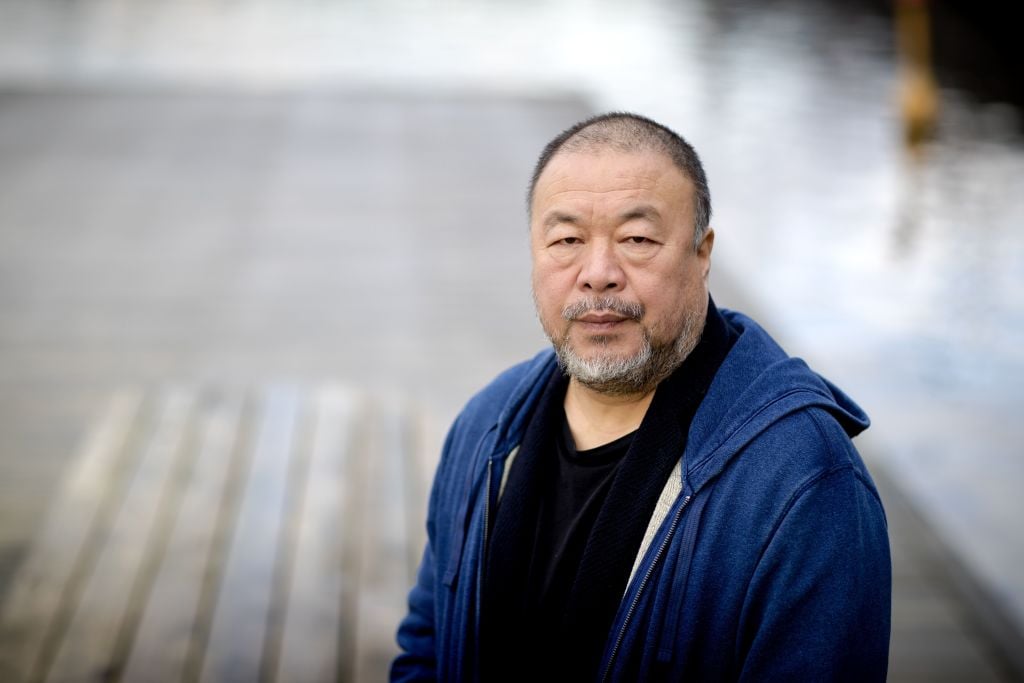
Dissident Chinese artist Ai Weiwei began work on a segment for the anthology film Berlin, I Love You while he was still under house arrest in 2015. More than three years later, the movie is due to be released this month—but Ai’s contribution is missing.
The artist, who is based in Berlin, says the segment he directed was cut because the producers were worried about alienating the Chinese government. He alleges that the Cities of Love franchise, which makes anthology feature films dedicated to cities around the world that combine short stories from different directors, is hoping to make Shanghai, I Love You and was concerned that featuring Ai’s contribution would sabotage the China project.
When Ai was invited to write and direct the sequence in 2015, he was unable to leave China due to the confiscation of his passport, and had to work on the film via Skype. His story featured his son, then-six-year-old Ai Lao, and girlfriend, documentary filmmaker Wang Fen, who were living in Berlin. As the first director to sign on to the project, Ai was instrumental in helping get it off the ground, and the artist’s involvement was touted in promotional materials.
“It was infuriating to find our involvement had been erased,” Ai recently wrote on Instagram, as first reported by Deutsche Welle. “The reason we were given for the episode’s removal was that my political status had made it difficult for the production team to secure further funding.”
The Chinese artist’s contribution to the film was “not politically sensitive at all,” Ai told the New York Times. “It was frustrating to see Western creators and institutions collaborating with Chinese censorship in such an obvious way.”
Chinese artist Ai Weiwei, his son Lao Ai, and his girlfriend Wang Fen at the Berlin premiere of the documentary film Ai Weiwei Drifting in 2017. Photo by Jörg Carstensen/dpa/Getty Images.
Claus Clausen and Edda Reiser, two producers on the film, confirmed the artist’s account. “We underestimated the power of China,” Reiser told the Los Angeles Times. “We were disappointed by the lack of support in the free world.”
“It was a very special project, especially the Ai Weiwei segment,” Clausen added. “I am furious that it’s not in there.” He told the Art Newspaper that including Ai’s film would have prevented the movie’s distribution in China, and that he agonized over the decision: “I couldn’t sleep for a very long time. I could still cry. I kept trying until the last moment. I tried my best, and we failed.” (He did not comment on whether the company’s plan to film Shanghai, I Love You was also a factor in the decision.)
The ensemble film, released February 8 by Saban Films, stitches together vignettes by 11 directors, including Fernando Eimbcke, Dennis Gansel, Peter Chelsom, and Massy Tadjedin. It features actors including Luke Wilson, Keira Knightley, Helen Mirren, Diego Luna, and Mickey Rourke. Currently, the movie holds just a 19 percent approval rating on Rotten Tomatoes, with RogerEbert.com noting that “the film does not exactly make a convincing case for the idea of Berlin as a hub of passion.”
The poster for Berlin, I Love You. Image courtesy of Saban Films.
Cities of Love is the brainchild of French film producer Emmanuel Benbihy, and is meant to illustrate the universality of love. The first film, Paris, je t’aime was released in 2006; followed by New York, I Love You (2008); Tbilisi, I Love You (2014); and Rio, Eu Te Amo (2014). Benbihy attributed Ai’s exclusion from the film to artistic differences.
“The assignment that is given to each director is to tell an encounter of love taking place today in a specific neighborhood of a city (Berlin here),” he told the New York Times. “Ai Weiwei’s segment did not comply with that assignment at all, and our main concern is always to create the unity of the film.”
Upcoming additions to the series are planned for Jerusalem, Venice, Delhi, Marseille, and New Orleans, as well as Shanghai. Shanghai, I Love You is being billed on the project website as “one of the first Chinese feature-films entirely shot and produced in the city of Shanghai.” It promises “a unique opportunity for a top director or for a very famous actor/actress” as well as final approval for directors on their segments—providing, of course, they don’t wind up on the cutting room floor.